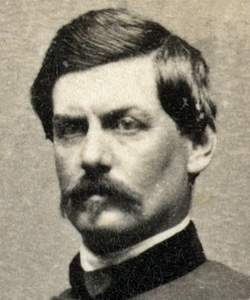George Brinton McClellan (American National Biography)
Scholarship
As commander of the Army of the Potomac, he was perhaps the only man in the country who could have won the war in an afternoon, but he was also one of the few who could have lost it in that span. The accomplishment of denying so formidable an opponent as Lee his goal of crushing the Army of the Potomac in the Seven Days' battles was not without merit, but its credit to McClellan was interred long before the general's bones were laid to rest. … Although on at least two occasions he had the power to reach forth his hand and end the war during the summer of 1862, timidity palsied that hand, and the killing went on for another two and a half years. Ironically, his failure of nerve ensured the adoption and full implementation of the hard war policies he deprecated, including emancipation. His squeamishness for the lives of his soldiers doomed them to added years of combat…Gifted with a brilliant intellect, McClellan also had personal charm and a remarkable ability to win the affection not only of his soldiers but of nearly everyone who came into contact with him…His ability as an organizer and motivator of troops was equally impressive.
He seemed unable or unwilling to apply his remarkable intelligence in new ways or in the face of unforeseen circumstances. His plans often had much merit to them, but he lacked the tough-mindedness to see them through to victory.
He seemed unable or unwilling to apply his remarkable intelligence in new ways or in the face of unforeseen circumstances. His plans often had much merit to them, but he lacked the tough-mindedness to see them through to victory.
Steven E. Woodworth, "McClellan, George B," American National Biography Online, February 2000, http://www.anb.org/articles/04/04-00674.html.
George Brinton McClellan, Election of 1864 (American National Biography)
Scholarship
McClellan sought and obtained the Democratic party's 1864 presidential nomination, but the convention was dominated by Peace Democrats, or Copperheads, who wrote a platform calling the war a failure and demanding an immediate armistice, with vague reference to a possible, though in reality highly unlikely, future restoration of the Union by peaceful negotiation. McClellan, in his letter accepting the nomination, tried unsuccessfully to distance himself from this extreme position, emphasizing his determination to continue the war until the Union was restored. The people, however, perceived McClellan and the Democrats, not without reason, as the party of peace and disunion. In the event, major Federal victories during the fall of 1864, particularly the capture of Atlanta, made a mockery of the Democratic platform and helped ensure McClellan's defeat by a landslide. Vote totals among soldiers were even more starkly against him, even in the Army of the Potomac that once idolized him.
On election day, before the results were known, McClellan wrote out his resignation from the army. He could live comfortably on the wealth produced by his stockholdings in the Ohio & Mississippi Railroad. Disgusted with the electoral decision of the American people, he left the country in January 1865 and traveled in Europe for three years.
On election day, before the results were known, McClellan wrote out his resignation from the army. He could live comfortably on the wealth produced by his stockholdings in the Ohio & Mississippi Railroad. Disgusted with the electoral decision of the American people, he left the country in January 1865 and traveled in Europe for three years.
Steven E. Woodworth, "McClellan, George B," American National Biography Online, February 2000, http://www.anb.org/articles/04/04-00674.html.














